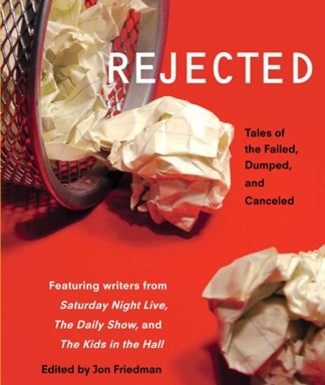
Writers are constantly exposed to a form of rejection. Well, no one likes to be rejected in any area, but we writers need to face the music more often than others. We apply to a lot of writing gigs both online and offline, try to get our stories/novels published, and/ or get our scripts read by producers/agents. And it doesn’t always matter whether we targeted the right market or abided by the guidelines. It doesn’t always make a difference that our writing is good, or the query letters rocked. John Grisham got rejected. J.K. Rowling got rejected. Do I really need to give more examples?
And having been writing full time since late 2009, I can say that I am pretty much at the start of the rejection cycle. Because although I have been writing since I was basically a preteen, I had never sent my writing to anyone besides my friends. I loved being read and I enjoyed a loyal following that loved what story I would come up with next.
But we all grew up and our lives became much more hectic than just going to school, socializing or dating. We were distracted by our career and family plans. That’s when I finally decided that I was not satisfied with writing just for me and my friends. I also wasn’t going to settle for some job I didn’t want because the economy sucked. It was time to follow my. So I dove straight into heavy research. I studied how magazine queries were made, how articles were formatted. I read about how you could sell your screenplays even if you lived a world away from Hollywood.
I read about blogging and writing, and applied what I learned. In addition to running several blogs, I got some decent gigs and continue to have them. I also keep getting rejected. Here is what I’ve learned so far:
1) Obviously, your samples won’t impress everyone. For many jobs, you will be either be overqualified or under-qualified. If you are overqualified, the job is highly unlikely to satisfy you.
2) With some gigs, you’ll have been 10 minutes/2 days/50 applicants too late to have applied.
3) Job-hunting for writers isn’t all that different from job-hunting for others.
4) You will be rejected, even if you avoided every rookie mistake you were supposed to avoid.
5) Many editors will not reply at all.
6) Some editors will just reply “No, Thanks”, only after you followed up twice.
7) It is be frustrating, but the acceptance e-mail and the check are all worth it. Yes, I am assuming the check is decent.
8) You constantly have to work on writing better, marketing and networking. And you need to keep querying.
**
A writer friend of mine recently mentioned that he hated the rejection letters that said that he was a good writer, the story was good but they were just not interested. I hate the letters that don’t come at all, or come very late. I have a whole article about it.
While obviously the news (of rejection) stinks, it at least enables you to move on, and learn. So try not to let it get you down so much. I once read somewhere that the more rejection letters you have in your drawer, the closer you are to being published. And then the author of the article had gone on to list the number of rejection letters famous authors got before they got lucky. The list is quite impressive.
Proof? John Grisham’s first novel is A Time to Kill. His first published worked however is The Firm. A Time to Kill got published after The Firm. Same guy, same style, same quality, both bestsellers. One just happened to be misjudged.
So the ultimate lesson is to hang in there. Your turn will come too, whether it is getting constant magazine gigs, or getting your fiction out there. You are just going to get rejected a lot in the process.
First you have to get your work seen. And this is relatively easy. Here is what I did many years ago. I wrote several One Act Plays (although you can write a 3-actor instead), and found someone who put them on in the N.Y. Village. The play was called ‘WALK-UP’, and was later made into a movie starring JAYNE MANSFIELD. She was killed the night after it wrapped. By then, however, I had started writing ‘SPEC SCRIPTS’ of successful TV series, and using the fact that I had a play produced in NY, I sometimes got the my spec scripts read. And that’s when I got a call from MGM, wanting to know if I’d like to write a ‘DR. KILDAIRE’. I naturally jumped at the chance, and have been writing ever since. TV mostly, but have also had 5 movies produced.
You wanna be a writer? Here’s what I told my students at UCLA. ‘WRITE TO TELL A STORY NOT SELL A STORY’. Do it enough times, getting better each time, getting it by hook or crook on someone’s desk, and you’d be surprised what will happen.
And most of all remember, “You must write to tell a story, and not sell a story.” gs
That’s good advice, although I’d love to get more tips from you. How would you get your work out there if it wasn’t a play but a novel? Or
a movie screenplay?
I like the advice that you have to write to tell a story and not to sell one. If selling gets in the way, then characters might get suffocated. Yes, we should have a marketable idea, but soulless and bland stories won’t get sold no matter how marketable the premise.